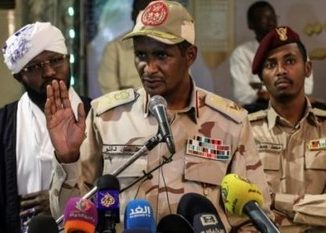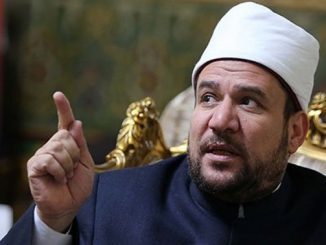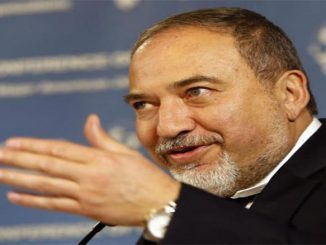
Recent media reports that Egypt’s General Intelligence Service hired two U.S. public relations firms in Washington to lobby on the country’s behalf and boost te regime’s image, has raised many speculations and questions.
The Associated Press reported that filings dated January 8, which were seen on the Department of Justice website, showed that the Egyptian General Intelligence Service has hired public relations firms Weber Shandwick and Cassidy & Associates Inc, to boosts regime’s image.
Moreover, it was also revealed that Egypt’s powerful spy service will pay $50,000 per month to DC lobbying Cassidy & Associates Inc and $100,000 per month Weber Shandwick, according to documents filed at US Department of Justice website.
“The registrations by one of Egypt’s feared, competing intelligence agencies, known as the Mukhabarat, were released publicly to comply with the U.S. Foreign Agents Registration Act (FARA) of 1938,” according to AP.
Foreign Agents Registration Act (FARA) requires “Persons acting as agents of foreign principals in a political or quasi-political capacity to make periodic public disclosure of their relationship with the foreign principal, as well as activities, receipts and disbursements in support of those activities.”
According to FARA law No. 22-611, which regulates the work of lobbying firms with foreign governments, requires that all companies that implement those activities inside the United States to enclose to US Department of Justice a copy of the financial contract, as well as record and document on all their activities and their communication practices whether political or semi-political.
In fact, the two new contracts included traditional missions that the companies will assist Egypt in promoting its “strategic partnership with the United States,” highlighting its economic development, showcasing its civil society and publicizing Egypt’s “leading role in managing regional risks.”
However, what is really nontraditional is that this is the first time that such engagements by the country’s powerful security apparatus are made public and it is also a rare move by an intelligence body.
It is also an unprecedented move for the Egyptian government, which traditionally delegates the Egyptian Embassy in Washington to finalize those kinds of contracts, which used to be signed by the Egyptian ambassador, who mainly acts as the Egyptian government’s representative on these documents.
But what was nontraditional this time is that the contracts were signed by Maj. Gen. Nasser Fahmy, on the lines marked out for Maj. Gen. Khaled Fawzy, who is the director general of the General Intelligence Service.
There are also several remarks: first, regarding the timing of the contract, which took place on January 18, only two days before the Donald Trump took his presidential duties.
This means that the searching process, the identification of the two companies, and the negotiations with them had practically taken place when Trump won the elections on November 8 last year or probably earlier. Also, it would also be linked to the expected visit of Abdel Fattah al-Sisi to Washington.
Second, the GIS’s two new contracts with the US public relations firms came after another contract was filed by the Egyptian government, represented by the Egyptian embassy in Washington, with Glover Park Group, one of the prominent lobbies in US.
It is worth to mention that this contract dates back to October 2013 and it costs $3 million which is paid by UAE, one of al-Sisi’s close allies.
In this context, there are three questions to be asked:
1- Were the two new contracts concluded as the former lobby, Glover Park, was close to the Democrats, and therefore, cooperation with them would not be fruitful as the White House and Congress are mainly controlled by the Republicans?
2- Was there a negative assessment from the Egyptian side (or UAE) regarding the effectiveness of the Glover Park group in affecting the political decision maker in US?
3- Does Egypt believe that increasing the number of firms collaborating in parallel with the Egyptian government in Washington would benefit more Egypt’s efforts and pressures in the US?
The third remark is the most important one because it is related to the entity which finalized the contract, the General Intelligence Agency, as for the first time information about the country’s powerful security apparatus is revealed publicly.
In this context, there are two scenarios:
First: Egypt’s General Intelligence Service was not aware of the US laws and norms that stipulate publishing these contracts and their details publicly.
Accordingly, publishing these documents has constituted an unpleasant surprise to the GIS that it did not plan or put into consideration.
Second: The GIS officials knew about the FARA law regulations but they did not care about publishing the contracts’ details to send a message to Al-Sisi that shows its power in Washington and highlight the weakness of the Egyptian Foreign Ministry in carrying out its work with Egypt’s most important ally.
According to this assumption, will the two companies also assist Egypt’s diplomats in Washington, coordinate with them, send them regular periodic reports and provide them with advice and consultations or that they (the two public relations firms) will only be in contact with the General Intelligence Service?
The last remark mainly casts the shadow over an important issue which is the Egyptian regime’s need to two more public relations firms, especially at a time when Abdel Fatah al-Sisi calls fon Egyptian to bear hard times and austerity measures due to economic problems that hit the country.
In the same context, why does the regime bear more costs despite Donald Trump’s tendency to extend support to authoritarian governments, including Egypt?
Al-Sisi was one of a few world leaders that Trump requested to meet when he was a presidential candidate on the sidelines of the UN General Assembly in September.
Moreover, al-Sisi was among the first world leaders to congratulate Trump on his victory.
In the same context, Sameh Shoukry was the first Arab official to meet US elect official in the new administration which infers how warm the relations will be between both countries.
Accordingly, it is more likely that Donald Trump administration will take steps in favor of the al-Sisi regime as “the two leaders have many views in common.”
It is known that Trump opposes the attempts of change in the Middle East known as “The Arab Spring”, tends to support stability, and is against any radical changes in the region. In addition, Trump views war on terrorism as a top priority for US foreign policy which will probably bring the two leaders together.
In this context, finalizing these two new contracts with the General Intelligence Service (GIS) directly amid signs of better relations between Egypt and Washington raises questions about a likely conflict between the GIS and the foreign ministry, a conflict power to please the presidency?
Mauritanian-American activist and scholar Nasser Wedaddy wrote on Twitter about the lobbying deals saying, “This is about the internal politics/rivalry between Egypt’s General Intelligence Service and the Foreign Ministry — the former bypassing the latter”
He added, “The intel. service has been of late involving itself in attracting investors and reassuring those already something the Foreign Ministry failed at. This is about the intel. service acting like a parallel foreign and economic affairs ministry.”
Others saw in the lobbying effort a worrying sign of fragmentation within Egypt’s security forces, a possible attempt by Egypt’s General Intelligence Service to use Washington to gain advantages over rival soldiers and cops.
Timothy Kaldas, a Cairo-based political scientist affiliated with the Tahrir Institute for Middle East Policy, said “I’d be interested to see if the lobby focuses on the GIS reputation vs. Egypt’s.”
He added, “I find it interesting how so many institutions are working on their personal reputations. Food aid is distributed from the Interior Ministry or army or GIS rather than in the name of the Egyptian state. Access to the Trump administration could increase its power vis a vis other institutions in the state.”



